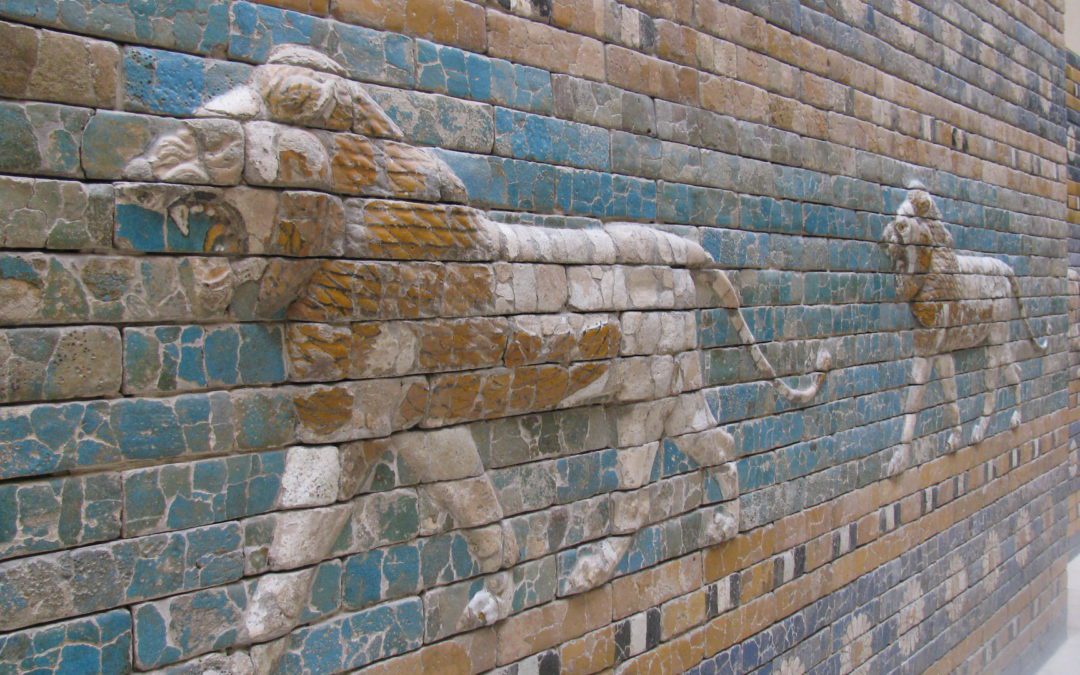
This is a portion of Babylon’s famous Ishtar Gate, which I saw in Berlin. It was reconstructed using original bricks from the gate that was created under King Nebuchadnezzar.
You may recall the classic VeggieTales video, Rack, Shack, and Benny, where the scheming zucchini, Nezzer, sings the infamous “Bunny Song.†Who can forget the lyrics, which talked about not wanting healthy food and loving the bunny, but not their dads or moms?
In the VeggieTales version of the story, Nezzer was an evil guy who forced people to bow down to an enormous 90-foot-tall chocolate bunny, so these lyrics made a lot of sense for him. But the problem was that the song was so catchy that children around the country started singing Nezzer’s “Bunny Song.â€Â Yes, they even sang the lyrics, “I don’t love my mom or my dad, just the bunny.” Some kids sang it in public!
So VeggieTales had to reissue a version of the song with nicer lyrics that children could sing around the house—the “Redeemed Bunny Song.†These lyrics were all about how you should obey your parents and not eat too much candy and chocolate. Eventually, the crisis was averted.
But who was the real person behind the Nezzer character and just how nasty was he?
In the Bible, his name is Nebuchadnezzar, and he was one of the most ruthless monsters to rule the ancient world. He sat atop the Babylonian Empire, which destroyed Jerusalem in 586 B.C. His soldiers burned houses, palaces, and temples, and according to some Jewish traditional sources, he slaughtered 80,000 people.
He also did terrible things to the king of Judah, Zedekiah, before having him carted away to the city of Babylon. The Babylonians were experts in some of the most horrifying forms of torture, which I won’t describe here or you’ll probably lose your lunch.
So it’s safe to say that Nebuchadnezzar was the Adolf Hitler of his day. No wonder Saddam Hussein, the brutal president of Iraq, claimed to be the reincarnation of Nebuchadnezzar.
After destroying Jerusalem and Judah, Nebuchadnezzar carried many Hebrews into exile in Babylon, including young men of noble blood, who “could also serve as hostages in case Judah got it in mind to rebel again,†said my pastor, Seth Kerlin, in a recent sermon. The Biblical hero, Daniel, was one of those young men, forced to come to Babylon.
Seth’s sermon focused specifically on the frightening dream that bothered Nebuchadnezzar, and my pastor had some insights that I had never noticed before. After this nerve-wracking nightmare, Nebuchadnezzar called on all of his magicians, enchanters, sorcerers, and astrologers, and he demanded that they tell him the interpretation of his dream.
But there was a catch.
Nebuchadnezzar told his astrologers that they also had to tell him what he dreamed—not just the interpretation. This was a clever way to find out if his magicians really had special power. If they couldn’t tell him his dream and provide an interpretation, he was going to kill them and their families.Talk about pressure.
But here’s a fascinating part, which my pastor pointed out. The magicians told Nebuchadnezzar, “The thing that the king is asking is too difficult, and no one can reveal it to the king except the gods, whose dwelling is not with mortals. They do not live among human beings.â€
Take special note of the line: The gods “do not live among human beings.â€
As Seth explained, this is another way of saying that “the gods do not see or probably even care about your plight.†So why would the gods bother to help the magicians and astrologers if they don’t care whether they live or die?
I had never noticed that line before.
“The pagan world tends to be a lonely one,†my pastor continued. The gods of the pagan world do not love or even care for humans, although occasionally one of the gods might fall in love with an individual person. In the Babylonian scheme of things, humans were made from the blood of the god Kingu, and they were created to be slaves to the gods. So it’s no wonder that the magicians said Nebuchadnezzar was asking the impossible. The gods didn’t care about them and were not about to lift a finger to help them figure out the king’s dream.
But if you read the story in the Book of Daniel, you’ll discover that the God of the Israelites is worlds apart from the Babylonian gods. Yahweh does love His people, and He made it possible for Daniel to do the impossible. With God’s help, Daniel was able to tell Nebuchadnezzar his dream, and then he interpreted it. (The interpretation wasn’t good news for Nebuchadnezzar, but that’s another story.)
The point is this: The world is a lonely place for anyone without God. For those with God, the world is empty of divine comfort. But for those who believe in a loving, caring God, we are not alone in the universe. That’s the Good News.
All that God asks in return is that we do not set any idols in front of him—not even monstrous chocolate bunnies.
By Doug Peterson
